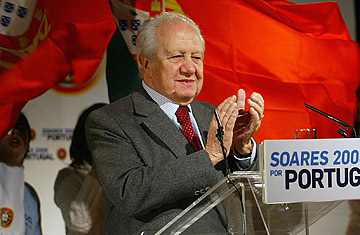
Although former President of Portugal, Mario Soares, above, was once tortured himself, he is in favor of accepting prisoners from Guantanamo Bay.
France and Finland are thinking it over. Spain has balked because of legal ramifications. Belgium and Austria have curtly concluded that America should clean up its own mess.
Europe was united during the Bush years in pushing for the closure of the controversial military prison in Guantanamo. But now that there's a president in the White House who wants to close the prison, most European countries are making themselves scarce. (See pictures inside Guantanamo.)
Except Portugal. The Portuguese government was the first to suggest that Europe take in Guantanamo prisoners as a practical way to help close the hated symbol of what many Europeans see as America's post-9/11 moral failure. And little Portugal, home to just 10 million people, remains the idea's most vocal backer.
For many Portuguese, and especially its politicians, the desire to close the camp is deeply personal. That's because Portugal's former dictatorship, in power between 1932 and 1974, used to torture its political opponents. Members of the current government include victims of that torture; Portuguese society is also dotted with its perpetrators. "The collective subconscious of the Portuguese is full of guilt," says Lisbon lawyer Francisco Teixeira da Mota, a human rights activist.
Former President Mario Soares, who was tortured and eventually exiled for his anti-fascist activities, remembers the interrogations and torture only too well. "I was made to go three days and three nights without sleep," he says of the kind of sleep deprivation tactics that have taken place at Guantanamo. Soares, now 83, has called Guantanamo "the scandal of all scandals" of the Bush administration, and says Europe must now help Obama close it. "Other countries must not be so egocentric," he says.
Domingos Santos a longstanding leader of Portugal's Communist party, also knows what's at stake. He was a victim of secret police beatings during the junta's rule. Deprived of sleep and forced to spend days in a tiny windowless cell without a bed, Santos remains an outspoken critic of the U.S. base at Guantanamo. Terrorists need to be punished, he says, but torture is never justified. "We could take some [prisoners in Portugal] on grounds of human rights because of Guantanamo is a cancer which is afflicting society," he told TIME. "I condemn terrorism. It is barbaric. But there are some [in Guantanamo] who cannot get a fair trial if returned to their own countries, or who would be in danger being tortured or even killed. Even the worst criminal has the right to a fair trial."
The hesitation by the rest of Europe centers on unanswered questions about which former prisoners might end up walking the streets and who would be responsible for monitoring their activities, providing jobs and health care, and potentially prosecuting and imprisoning them. There's also the issue of Europe's open borders: if an ex-prisoner is given full liberty in one European country he could eventually wind up in any other. (See pictures of the changing face of Europe.)
E.U. foreign ministers continue to debate the issue, and thus far it appears that the only Guantanamo detainees that could eventually end up in Europe are those who have not been charged with a crime, but who risk persecution if returned to their country of origin. Some 60 of the 260 current prisoners on the US military base in southeastern Cuba fit that description.
Ana Gomes, Vice-Chairwoman of the European Parliament's Subcommittee on Security and Defense, and the spearhead behind Lisbon's effort to lead the way on the issue, says resolving Guantanamo is in Europe's own interests. "It is important strategically to improve transatlantic relations," she says. "With Obama the attitude has changed so the allies now can get together. It is also important politically for the West to be championing human rights." And there's perhaps no country better to do that than one which understands what it means when human rights are trampled.
